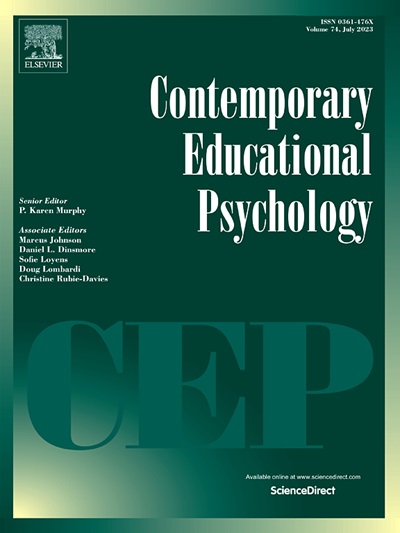批判性思维教育减少中学生的阴谋和超自然信仰:第一阶段试验
IF 3.8
1区 心理学
Q1 PSYCHOLOGY, EDUCATIONAL
引用次数: 0
摘要
毫无根据的信仰,特别是超自然现象和阴谋论信仰,不符合当代科学的知识和证据,并导致公共卫生风险(例如,对疫苗的犹豫)和社会危害(例如,反民主态度)。有效的K-12教育干预措施仍然很少。该I期随机对照试验评估了法国中学生(8年级和9年级,n = 135)的批判性思维(CT)干预。干预包括8小时的标准化CT教育干预,每周8次,每次1小时,旨在通过针对与UB相关的认知过程(例如,过度依赖直觉,本体论混淆)来提高理性判断。与对照组相比,接受干预的儿童在干预后(d = 0.56)和随访时(d = 0.53)表现出较少的阴谋信念。超自然信念显示出较小的立即减少(d = 0.49),但在一个月后恢复到基线。这是第一个随机试验,证明了一个可行的,标准化的CT干预减少了中学生的超自然和阴谋信仰。本文章由计算机程序翻译,如有差异,请以英文原文为准。
Critical thinking education to decrease conspiracy and paranormal beliefs among secondary school students: A phase I trial
Unfounded beliefs (UB), specifically paranormal and conspiracy beliefs, are not in accordance with knowledge and evidence of contemporary science and lead to public health risks (e.g., vaccine hesitancy) and societal hazards (e.g., anti-democratic attitudes). Effective educational interventions for K-12 contexts remain scarce. This phase I randomized-controlled trial evaluated a critical thinking (CT) intervention among secondary school students in France (8th and 9th graders, n = 135). The intervention, consisting of an 8-hour standardized CT education intervention, delivered in eight weekly 1-hour sessions, aimed to improve rational judgment by targeting cognitive processes linked to UB (e.g., overreliance on intuition, ontological confusions). Compared to a control group, children receiving the intervention showed reduced conspiracy beliefs post-intervention (d = 0.56) and at follow-up (d = 0.53). Paranormal beliefs showed a smaller immediate reduction (d = 0.49) but returned to baseline after one month. This is the first randomized trial demonstrating a feasible, standardized CT intervention reducing both paranormal and conspiracy beliefs in secondary school students.
求助全文
通过发布文献求助,成功后即可免费获取论文全文。
去求助
来源期刊

Contemporary Educational Psychology
PSYCHOLOGY, EDUCATIONAL-
CiteScore
16.50
自引率
3.90%
发文量
74
期刊介绍:
Contemporary Educational Psychology is a scholarly journal that publishes empirical research from various parts of the world. The research aims to substantially advance, extend, or re-envision the ongoing discourse in educational psychology research and practice. To be considered for publication, manuscripts must be well-grounded in a comprehensive theoretical and empirical framework. This framework should raise critical and timely questions that educational psychology currently faces. Additionally, the questions asked should be closely related to the chosen methodological approach, and the authors should provide actionable implications for education research and practice. The journal seeks to publish manuscripts that offer cutting-edge theoretical and methodological perspectives on critical and timely education questions.
The journal is abstracted and indexed in various databases, including Contents Pages in Education, Australian Educational Index, Current Contents, EBSCOhost, Education Index, ERA, PsycINFO, Sociology of Education Abstracts, PubMed/Medline, BIOSIS Previews, and others.
 求助内容:
求助内容: 应助结果提醒方式:
应助结果提醒方式:


